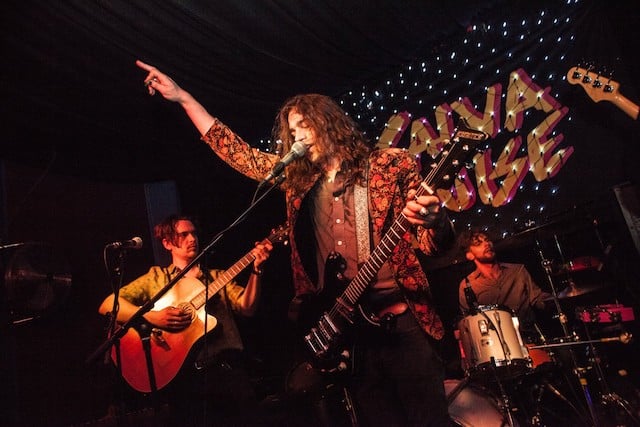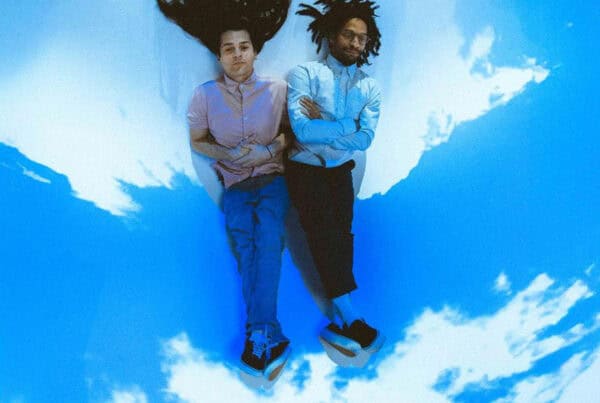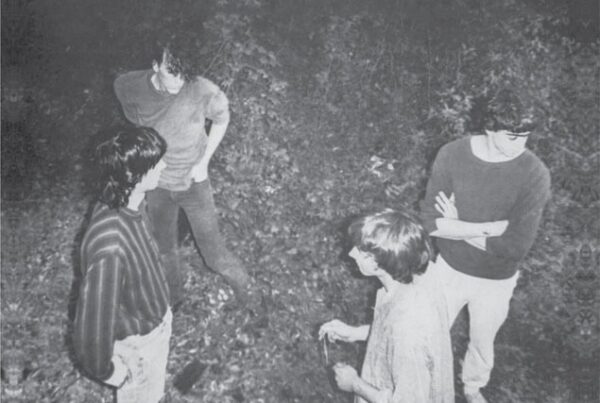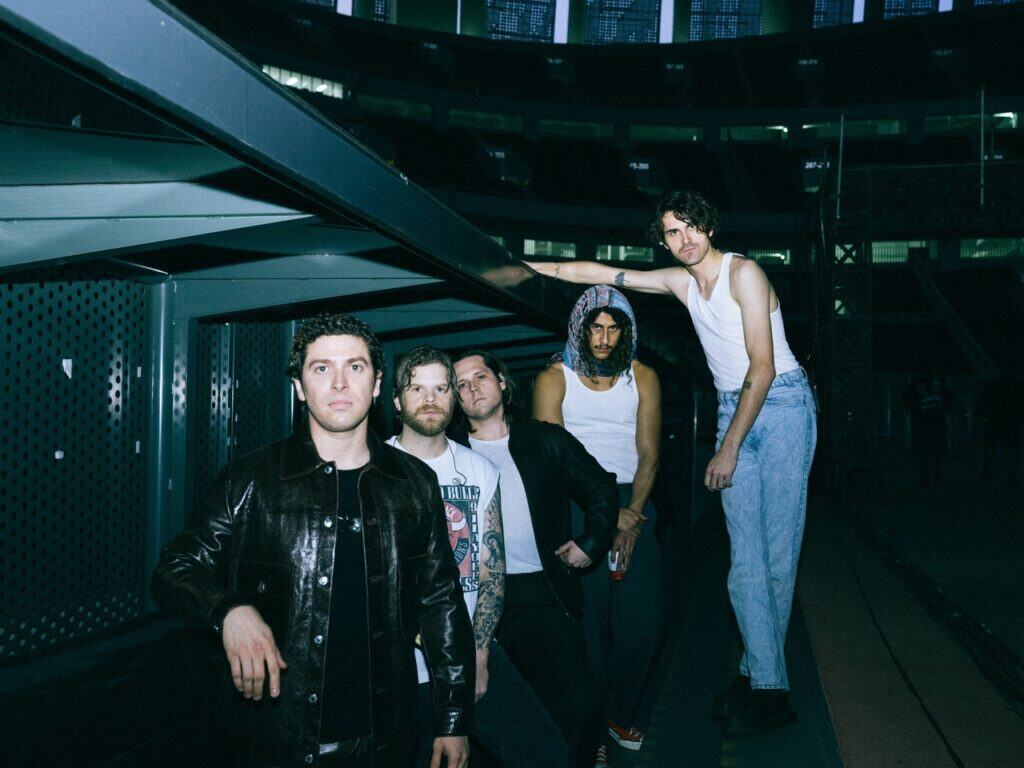Rich Fownes opens up about mental health and his time touring with Nine Inch Nails, UNKLE, The Eighties Matchbox B-Line Disaster and Bad For Lazarus.

Bands are not meant to last forever. Their lifespans are painfully short: there is only one bullet in the gun – one shot, and it’s all over. While their members often try to reincarnate themselves in new, slightly eyebrow-raising outfits, there is always a zenith, a moment of ‘this is as good as it’s ever going to get’. Rich Fownes is an exception to the rule. The Brighton-born guitarist is a chameleon, changing his colours to suit bands you could count on both hands, from Eighties Matchbox B-Line Disaster, to UNKLE, Bad for Lazarus and Nine Inch Nails, to name but a few. He has played to the smallest rooms, to the loudest venues with thousands of people across the world. Fownes has tasted every flavour of success, its sweetness as well as its bitterness, and the sum of those experiences amount to a certain wisdom.
Rich Fownes doesn’t see through rose-tinted glasses. In fact, he wishes people would take them off for once, and see things for what they truly are. He doesn’t gloss over the truth: a spade is, after all, only a spade. “I try not to define success in any terms, man,” he says, “because that’s such a strange and non-binary idea, anyway. One day, when you can’t pay your rent, success is about money – and that’s when you feel like you’re not successful. Then, in another position, when you’re pulling a really good income from music, but it’s not the music you want to be playing and it’s consuming your entire life, that doesn’t feel like success, either. So I guess success is a matter of balance: trying to do something that’s fulfilling and might take care of a couple of bills, as well.
By anyone’s measure, Fownes’ career has been filled with the kind of opportunities that would be ridiculous to say no to. Commercially speaking, at least, he reached his zenith when Nine Inch Nails’ Trent Reznor asked if he would join the band. “Who turns that sort of thing down?”, he asks – the irony is not lost, however, because the ‘who’ in question was Rich Fownes himself. At that point, he was still entrenched in the self-described ‘dark psychosis rock’ quintet Eighties Matchbox B-Line Disaster: “that was my home, they were my friends.” After finishing their album, Fownes found that his manager had kept the conversation open a year down the line, and that was when he moved to LA and left the Brighton skies behind him.
We ask, when those opportunities fell into his lap – just like being invited to perform with trip-hop outfit UNKLE around the world – if he had at last felt a sense of bliss. “Of course not”, he answers, truthfully. “That’s not how I work at all. You’re always working towards something, and like I say, when I got a really good money gig when I was playing with UNKLE, and I was playing in front of thousands of people every night, touring everywhere you can imagine, I was quite fixated on wanting to do my own writing.” Ever since he started his career in music, the dream he valued most was to start something of his own.
“I was thinking about that, to be honest,” he shares. “I was kind of aware that I should be someone walking on that stage, going ‘this is so amazing’, you know? It wasn’t that I took it for granted, but it wasn’t this moment of success that hit me all at once.” He recalls when UNKLE headlined Brixton Academy, and the roar of its packed-out room, compared to his earliest days with Matchbox, when they finished a new song and was met with “the loudest silence I had ever heard.” At the time, he admits he barely registered it: “It’s only ten years later, with reflection, that it feels a little bit more like success. Until then, it’s just a flash in the pan.”
This notion of perception and reality is something Fownes is keen to iron out. His brief stint with Nine Inch Nails could have felt like an enormous blow, but he insists, “I wouldn’t call it a failure, I’d just call it the past.” There were no hard feelings when he left the band; he speaks about it in a calm, measured way: “I don’t really look at it as a disaster or a failure” – but one thing he is quick to stress is that it was not a case of him giving up. “It was more of a kicking out,” he says. “I remember turning up to a practise with one of the members, saying ‘good morning’, and not getting anything back. I looked at my tech, and he shrugged. So now I look back on it, it had been persistent for a few days. At that point, I thought all there was to practise was being in your corner and fucking around. The only other band I had creative practises with was Matchbox – and those were some noisy practises, man. Some weird shit was happening. But I thought, ‘I’m here now. I’m going to figure my way around the songs and figure out some Rich Fownes notes’, while they’re going, ‘What the fuck is he doing?’ I think we were just there to play the songs, and no one kind of said, ‘Why are you fucking around with stuff?’ I’m not angry about it. It was an absolutely barmy thing to have done in the first place.”
The time after that was a blur; Fownes struggles to recall the days and weeks that followed. His father passed away the very same weekend he received a phone call offering to fly him home tonight or tomorrow, which would he prefer? “At that point, I was just a bit of a space cadet, man,” he says. “I wasn’t very present.” Looking back, Fownes felt that his experience in LA, while sounding like living the dream, was quite an isolating experience. “It was lonely, man”, he tells us. “I mean, for fuck’s sake, I couldn’t drive. I was living in LA, and my apartment went straight out into a highway. I was living quite a bold new life, which was definitely quite fun, but everyone I knew was here, at home.” It was then, after leaving LA for good, that he realised what he truly wanted to do. His ambitions, he discovered, where far greater than joining bands and playing other people’s songs.
It was then that he decided to start a band – this time, his own. They were called Bad for Lazarus. Their sound, a psychedelic noise freak-out, gave Fownes the space to ‘fuck around with stuff’ – this time, with abandon. “You’ve got to understand, Bad for Lazarus was a response to me being thrown out of Nails, so I had a lot of ego wrapped up in the success for that,” he explains. While the band generated a dedicated following, the path the band took was hardly any smoother than his tumultuous stretch with Nine Inch Nails. “It’s funny that you think we seemed really happy,” Fownes says. “There was a Brighton movie that had lots of bands in it, and a friend was asking why Lazarus wasn’t involved in that movie, and my answer, as a joke, was that we were probably outside having an argument with each other.”
While Fownes never considered image to be crucial, he understands that from the outside looking in, Bad for Lazarus seemed like a happy-go-lucky band. “I think our kind of smiley persona was probably more us just being silly on stage, to be honest,” he says. “It felt like a moody band to be in. It’s only been in the last couple of years that we’ve rediscovered our friendships – there was quite a lot of damage in the band, I think, personally.” While drifting from band to band kept Fownes safely aboard the “cliché train of success”, he had finally arrived at what he hopes will be his final destination: a solo career.
His upcoming project, which he has been told to stay tight-lipped about, is “a flamboyant explosion of personality”. For once, it’s all built upon a foundation of honesty, to write music that at last resonates with himself. “When I was writing a song before – let’s say when I was doing Lazarus, for example – I was very aware of how it was going to be interpreted. I was almost writing for the listener. Now, when I’m writing a song, I won’t do it unless I have a lyric that cracks me up, something that I’ve said so casually yet to the point – the sort of things you’d be afraid to put in a lyric is where it all begins.”
In all of his years of experience, though, Fownes admits that he feels out of depth, at times. “I wanna prove myself, man,” he says. “But at the same time, no one’s gonna sit down and write music to that brief and write their best song. There’s always a bit of a brick wall to hit your head against.” While he tells us that this time is, musically, the most exciting of his life, it’s by no means easy. Rich reflects on how creative flow doesn’t always come easily: “I have really fucking hard days, sometimes. I sit down, I try and write, and it’s difficult to get accustomed to that.”
But when he gets it right, it feels like the most accomplished work he has made to date, but to do that, he’s had to lay all of his cards on the table. “It’s been a 100% turnaround from posing and worrying, to just letting it all out on the line, man,” Fownes says. “When people have heard some of the music that’s coming up, there were a few questionable lyrics in there that made them sort of writhe in discomfort. There are a few things in my life that I’ve had to address with that kind of precision.”
His song-writing, he describes, is a “journey to self-actualisation”. To do this, he has had to take long, uncomfortable looks at himself. “I suppose there was a lot of childhood issues and trauma that I hadn’t really done the maths on,” he explains. “I looked at all of the fragmented pieces, and when I put it together it was something quite different to what I imagined it would be, which of course frames the present in a whole new way, as well. Everything was put under examination, including music, as well. That’s part of why my music got a lot more honest. Suddenly that became a really big priority of mine.”
There was a quote from Johnny Rotten which goes like this: “I don’t have any heroes. They’re all useless.” It’s a sharp injection of nihilism which Fownes has held close to himself throughout his career; he still believes it to be true now. In fact, a dose of nihilism, he shares, is one of the key ways he keeps his mental health in check. “Growing up in Matchbox, with maniacs being my rock’n’roll parents, the attitude was that everyone sucked, and everything was stupid. That’s healthy, actually,” he says. “From an artistic point of view, it brings everything down to the same thing. Nothing is important.”
Even though he prides his upcoming solo work on being the most reflective of himself, he – confusingly – admits, “In a way, it’s going to be my biggest pose yet. It’s going to be very characterful, and I don’t mean that in a silly way. It will be a character, almost, but that character is me, in my most primordial, raw form.” It’s a strange dichotomy, and Fownes realises that, too. But this incarnation is going to be the one he has always wanted us to see, which has never really had the chance to see the light of day.
He’s found that some of his most spontaneous, easy to listen to, and fun music has come from a place of letting his guard down, and in the end, his intentions boil down to something simple he feels he had lost sight of. “In the future, I plan to work with smart, talented people who understand the mania I’m trying to portray,” Fownes says. “I think you get the best results when you have fun with everything. I want to capture some of that chaotic sparkle between human beings – that’s what I wanna do.”
Interview: Dom Smith / Words: Sophie Walker / Images: Kiera Anee






